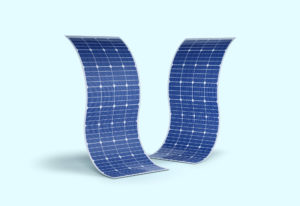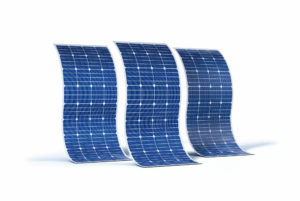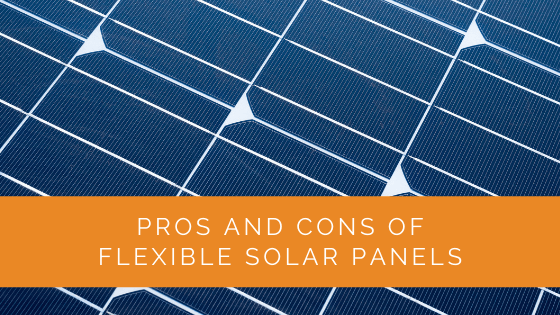Flexible solar panels are becoming more popular as they become cheaper to produce by the day. Not only that, but they also have many benefits that make them an attractive option for homeowners.
However, there are some downsides that you should consider before buying flexible solar panels.
In this article, we’ll cover all the pros and cons of flexible solar panels so you can decide if they’re right for your home. Let’s get started!
Contents
- 1 What Are Flexible Solar Panels?
- 2 Pros of Flexible Solar Panels
- 3 Cons of Flexible Solar Panels
- 4 Case Study: Implementing Flexible Solar Panels in a Residential Setup
- 5 Expert Insights From Our Solar Panel Installers About Flexible Solar Panels
- 6 Discover the Power of Solar with Solar Panels Network
- 7 In Conclusion
What Are Flexible Solar Panels?
Before getting into the pros and cons of these panels, let’s first look at exactly what they are. Flexible solar panels are similar to standard photovoltaic cells in converting the sun’s energy into usable electricity. In this respect, you could call them a type of photovoltaic power system.
However, their design is what makes them unique. Flexible solar panels are made from ultra-thin, bendable material that can be attached to nearly any surface. They don’t have to remain flat against your roof or ground to produce electricity. Instead, you can curve or roll them up to follow the shape of whatever surface you attach them to.
This also means you can pull them in and out of the sun as it moves across the sky, maximising their exposure. They’re even strong enough to stand up against wind and rain when attached to a vertical surface!
With that said, let’s examine their main pros and cons.

Pros of Flexible Solar Panels
Why would you want to use flexible solar panels instead of standard ones? Well, quite a few benefits make them an attractive option for homeowners. Here are just a few:
Portability
Thanks to their lightweight and thin design, flexible solar panels are easier to transport, so you can relocate them if necessary. This is great for putting them in a sunny spot on days when you need extra power or moving them to a shadier spot when you don’t need as much power.
Flexible solar panels are also rolled up or folded when not in use, making them easy to store!
Versatility
You can attach flexible solar panels to nearly any surface, which gives you a great deal of flexibility when placing them. They even come in different colours and shapes to choose one that best suits your needs.
In addition, the placement of these panels allows you to use whatever surface they’re attached to to gather solar energy. For instance, if you attach them to the roof of your shed, you could then use that roof as a partial shelter for storing your lawnmower and any other tools!
Convenient Installation
One of the greatest benefits of using flexible solar panels instead of standard ones is that they’re much easier to install. This means you sometimes don’t need the help of an experienced professional to get them set up in no time!
All you have to do is find a surface that gets plenty of sunlight throughout the day, then attach these panels to it using magnets or some other adhesive (yes, they have adhesive backing!).
This also means you could attach them to a fence or backyard shed to turn it into a mini power station.
Once you’ve done that, flip the switch, and they should start working like a charm!
Low Cost
Since flexible solar panels don’t require a complicated mounting system, they’re often much cheaper than standard ones. On top of that, their manufacturing costs are dropping faster than standard solar panels, so you can expect to save even more in the long run.
This is great news for homeowners on a tight budget who want to add extra power to their homes!
Semi-Transparency
One of the greatest benefits of adding flexible solar panels to your home is that they’re semi-transparent. This means you can place them against a window or any glass and still be able to see through them. This is great because you don’t lose the view while gaining extra power.
Cons of Flexible Solar Panels
While flexible solar panels have plenty of benefits, a few drawbacks should give you pause before making a purchase. Let’s take a look at some of them:
Their Adhesiveness Makes Them Less Secure
While the adhesive backing makes it easy to attach these panels to any surface, this same property means they’re not as secure. If they get bumped or moved out of place, they can come loose and slip off their given surface. And once they reach the ground, you may never be able to retrieve them.

Less Durability and Shorter Lifespan
Flexible solar panels are more likely to suffer damage than standard ones because their material makes them thinner, weaker, and more fragile. This means they can crack or break more easily, dramatically reducing their lifespan. On average, their lifespan is around 10 to 15 years, half of what you’d get with rigid solar panels.
Subpar Warranties
Flexible solar panels come with shorter warranties than ridged solar panels. Sometimes, you’ll only get a ten-year warranty instead of a standard 25+ years! This is because the warranty is tied to the lifespan of the panels, not your home or how you use them. Because they won’t last as long, the company can’t offer you a lengthy warranty either.
This not only means that their durability is in question but also makes them less valuable.
They Can Be Toxic
The chemicals used to make some flexible solar panels are more harmful than those used in standard panels. They’re also harder to recycle and dispose of at the end of their lifespan.
For instance, CdTe panels contain toxic cadmium, and while “safe” levels of exposure exist, prolonged exposure could be dangerous. So, if your kids play near these panels or you frequently touch them with your hands, there might be a higher risk for cadmium poisoning than other types of solar panels.
Plus, when it’s time to dispose of them, they could also be very harmful to the environment, so make sure you dispose of them properly to avoid that.
Low Efficiency
Lastly, the biggest problem with flexible solar panels is that they’re less efficient than standard ones. Their average efficiency rates fall between 10% and 17%, while you can expect efficiency between 16% and 23% with rigid panels.
That means you have to buy more panels to produce the same amount of electricity, increasing your cost.
Case Study: Implementing Flexible Solar Panels in a Residential Setup
Background
A homeowner in the UK sought to install solar panels on their curved, metallic roofing. The unique architecture of the home made traditional solar panels impractical, prompting the exploration of flexible solar panel solutions.
Project Overview
The objective was to install a solar panel system that could efficiently generate electricity while conforming to the roof’s curved surface. The homeowner was particularly interested in the aesthetic appeal and ease of installation offered by flexible solar panels.
Implementation
- Assessment and Planning: Our team conducted an assessment to determine the best placement for the flexible panels, ensuring maximum sunlight exposure throughout the day.
- Selection of Panels: Flexible solar panels with high efficiency and a suitable aesthetic were selected. The panels chosen were semi-transparent, allowing light to filter through while providing shade to the underlying area.
- Installation Process:
- Surface Preparation: The roof was cleaned thoroughly to ensure proper adhesion of the panels.
- Adhesive Application: The panels were secured using a specialized adhesive suitable for metal surfaces, ensuring a strong bond without damaging the roof.
- Wiring and Connectivity: The panels were wired to a central inverter located inside the house, converting the DC electricity generated into usable AC electricity.
Results
- Energy Production: The flexible solar panels achieved an efficiency rate of approximately 15%, providing sufficient energy to power most of the home’s lighting and small appliances.
- Aesthetic and Functional Benefits: The semi-transparent nature of the panels added an attractive feature to the home’s exterior while also providing shade and reducing heat absorption on the roof.
- Cost Efficiency: The total installation cost was lower than a traditional solar setup, primarily due to the ease of installation and the lack of need for a mounting system.
Summary
The project demonstrated the practicality of flexible solar panels in residential settings with unconventional architecture. While the efficiency was slightly lower than traditional panels, the benefits of easy installation, aesthetic appeal, and functional versatility made them an ideal choice for this particular home. Solar Panels Network successfully implemented a solution that met the homeowner’s energy needs while complementing the unique design of the property.
Expert Insights From Our Solar Panel Installers About Flexible Solar Panels
Flexible solar panels offer a fantastic solution for those tricky installation spots where traditional panels just wouldn’t fit. They’re lightweight and easy to install, making them perfect for RVs or curved surfaces.
Senior Solar Installation Engineer
The versatility of flexible solar panels is unmatched. However, it’s important to remember that they typically offer lower efficiency compared to their rigid counterparts. For homeowners with limited space, traditional panels might still be the better option.
Renewable Energy Consultant
While flexible solar panels are a great innovation, they do come with some durability concerns. Regular maintenance checks are crucial to ensure they remain securely attached and continue to function properly.
Solar Energy Specialist
Discover the Power of Solar with Solar Panels Network
Are you navigating the world of solar installations? Look no further than Solar Panels Network, the UK’s trusted partner in harnessing the sun’s potential. Our dedication goes beyond just installations; we’re on a mission to transform how homeowners and businesses across the UK perceive and utilise energy. By choosing us, you’re reducing your carbon footprint and making a smart financial move that promises savings for years ahead. Contact us today and embark on your solar journey.
In Conclusion
So, that was a brief look at the pros and cons of flexible solar panels! While they come with plenty of benefits, you should consider their limitations before making any decisions.
For instance, a more secure option will be better if you want to use them on a commercial building, where they will likely be bumped and knocked off often.
But if you place them on a surface that never gets touched – like the side of your house – flexible solar panels could be perfect! It all boils down to what you want to use them for and where to place them.
About the Author
Solar Panels Network stands at the forefront of solar energy solutions, driven by a team of seasoned solar engineers and energy consultants. With over decades of experience in delivering high-quality solar installations and maintenance, we are committed to promoting sustainable energy through customer-centric, tailored solutions. Our articles reflect this commitment, crafted collaboratively by experts to provide accurate, up-to-date insights into solar technology, ensuring our readers are well-informed and empowered in their solar energy decisions.

